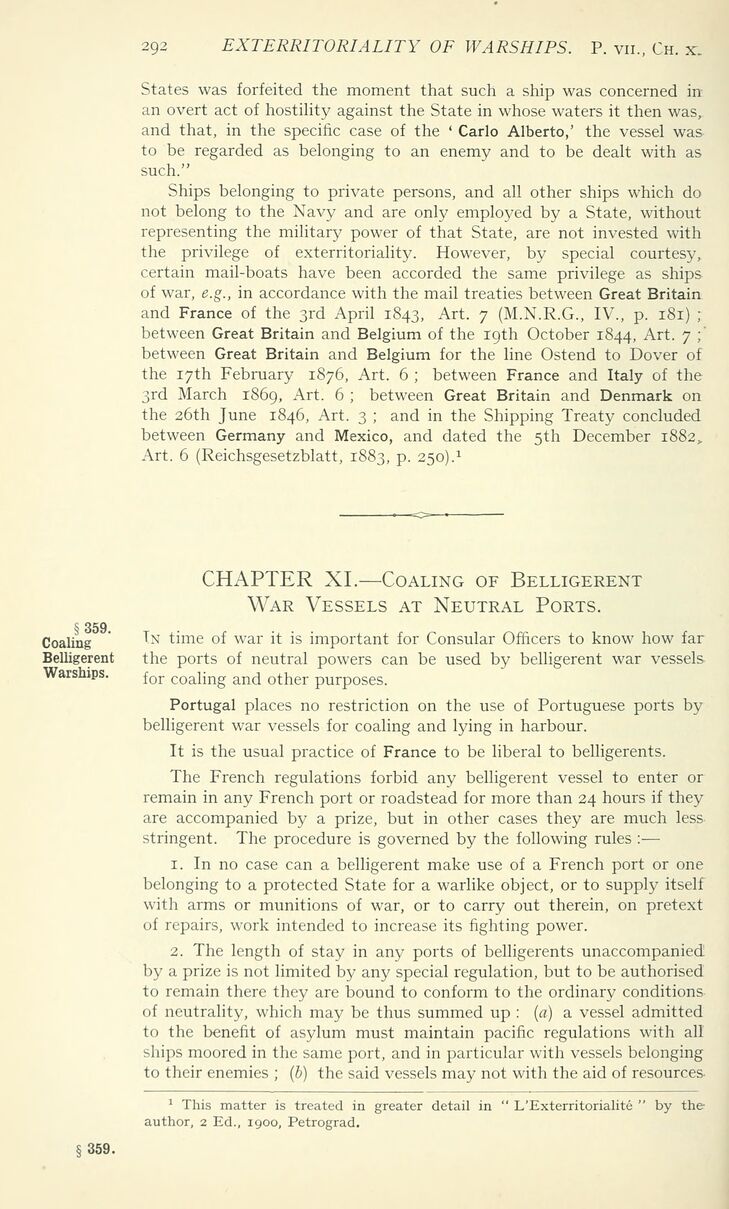
Full resolution (JPEG) - On this page / på denna sida - Pages ...

<< prev. page << föreg. sida << >> nästa sida >> next page >>
Below is the raw OCR text
from the above scanned image.
Do you see an error? Proofread the page now!
Här nedan syns maskintolkade texten från faksimilbilden ovan.
Ser du något fel? Korrekturläs sidan nu!
This page has never been proofread. / Denna sida har aldrig korrekturlästs.
2Q2 EXTERRITORIALITY OF WARSHIPS. P. ѵн., Сн. x.
States was forfeited the moment that such a ship was concerned in
an overt act of hostility against the State in whose waters it then was,
and that, in the specific case of the ’ Carlo Alberto,’ the vessel was
to be regarded as belonging to an enemy and to be dealt with as
such."
Ships belonging to private persons, and all other ships which do
not belong to the Navy and are only employed by a State, without
representing the military power of that State, are not invested with
the privilege of exterritoriality. However, by special courtesy,
certain mail-boats have been accorded the same privilege as ships
of war, e.g., in accordance with the mail treaties between Great Britain
and France of the 3rd April 1843, Art. 7 (M.N.R.G., IV., p. 181) ;
between Great Britain and Belgium of the 19th October 1844, Art. 7
between Great Britain and Belgium for the line Ostend to Dover of
the 17th February 1876, Art. 6 ; between France and Italy of the
3rd March 1869, Art. 6 ; between Great Britain and Denmark on
the 26th June 1846, Art. 3 ; and in the Shipping Treaty concluded
between Germany and Mexico, and dated the 5th December i882>
Art. 6 (Reichsgesetzblatt, 1883, p. 250).1
§ 359.
Coaling
Belligerent
Warships.
1 This matter is treated in greater detail in " L’Exterritorialite " by the
author, 2 Ed., 1900, Petrograd.
CHAPTER XI.—Coaling of Belligerent
War Vessels at Neutral Ports.
In time of war it is important for Consular Officers to know how far
the ports of neutral powers can be used by belligerent war vessels
for coaling and other purposes.
Portugal places no restriction on the use of Portuguese ports by
belligerent war vessels for coaling and lying in harbour.
It is the usual practice of France to be liberal to belligerents.
The French regulations forbid any belligerent vessel to enter or
remain in any French port or roadstead for more than 24 hours if they
are accompanied by a prize, but in other cases they are much less
stringent. The procedure is governed by the following rules :—
1. In no case can a belligerent make use of a French port or one
belonging to a protected State for a warlike object, or to supply itself
with arms or munitions of war, or to carry out therein, on pretext
of repairs, work intended to increase its fighting power.
2. The length of stay in any ports of belligerents unaccompanied
by a prize is not limited by any special regulation, but to be authorised
to remain there they are bound to conform to the ordinary conditions
of neutrality, which may be thus summed up : (a) a vessel admitted
to the benefit of asylum must maintain pacific regulations with all
ships moored in the same port, and in particular with vessels belonging
to their enemies ; (b) the said vessels may not with the aid of resources
§ 359.
<< prev. page << föreg. sida << >> nästa sida >> next page >>